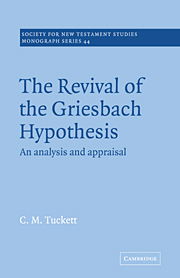Book contents
- Frontmatter
- Contents
- Acknowledgements
- Note on Abbreviations
- Introduction
- Part I Some Aspects of the History of the Study of the Synoptic Problem
- Part II General Phenomena
- Part III Some Particular Texts
- SECTION A SELECTED MARKAN PASSAGES: Introduction
- 9 The Healing of the Man with the Withered Hand
- 10 The Synoptic Tradition on Uncleanness
- 11 The Cleansing of the Temple
- 12 Tribute to Caesar
- 13 The Double Commandment of Love
- 14 The Woes against the Scribes and Pharisees
- 15 The Widow's Mites
- SECTION B THE DOUBLE TRADITION: Introduction
- 16 Wisdom Motifs in the Double Tradition
- 17 The Apocalyptic Discourses
- Conclusion
- Appendix
- Notes
- Abbreviations
- Bibliography
- Index
11 - The Cleansing of the Temple
from Part III - Some Particular Texts
Published online by Cambridge University Press: 18 January 2010
- Frontmatter
- Contents
- Acknowledgements
- Note on Abbreviations
- Introduction
- Part I Some Aspects of the History of the Study of the Synoptic Problem
- Part II General Phenomena
- Part III Some Particular Texts
- SECTION A SELECTED MARKAN PASSAGES: Introduction
- 9 The Healing of the Man with the Withered Hand
- 10 The Synoptic Tradition on Uncleanness
- 11 The Cleansing of the Temple
- 12 Tribute to Caesar
- 13 The Double Commandment of Love
- 14 The Woes against the Scribes and Pharisees
- 15 The Widow's Mites
- SECTION B THE DOUBLE TRADITION: Introduction
- 16 Wisdom Motifs in the Double Tradition
- 17 The Apocalyptic Discourses
- Conclusion
- Appendix
- Notes
- Abbreviations
- Bibliography
- Index
Summary
This pericope is analysed in some detail by Farmer, Longstaff and Orchard to see if the texts are susceptible to explanation along Griesbachian lines. There are some agreements between Matthew and Luke against Mark: both agree in omitting the whole of Mark's verse 16, and also the phrase ‘for all the nations’ at the end of the quotation of Is. lvi. 7; further, both agree that the incident took place on the same day as the entry into Jerusalem, unlike Mark who dates it a day later. The shorter texts of Matthew and Luke will be considered later. With regard to the different chronology, Farmer says that this indicates that ‘Mark was not unwilling to exercise his freedom’ in dealing with his sources. However, this is very strange for an author trying to combine his two sources where they agree and to give their concurrent testimony. An appeal to editorial freedom is scarcely sufficient to explain this anomaly for the GH. A satisfactory explanation must surely give a rather more substantial reason for this editorial change by Mark, if such it be. (Possible reasons why Matthew and Luke might have changed Mark will be considered later.)
Farmer starts by considering the ‘sandwich’ structure of Mk. xi. 12–20, in which the story of the cleansing interrupts the two halves of the story of the cursing of the fig-tree. On form-critical grounds, he says, Mark is shown to be secondary, since the original form of the story of the fig-tree must have been a unified whole.
- Type
- Chapter
- Information
- Revival Griesbach Hypothes , pp. 111 - 119Publisher: Cambridge University PressPrint publication year: 1983



